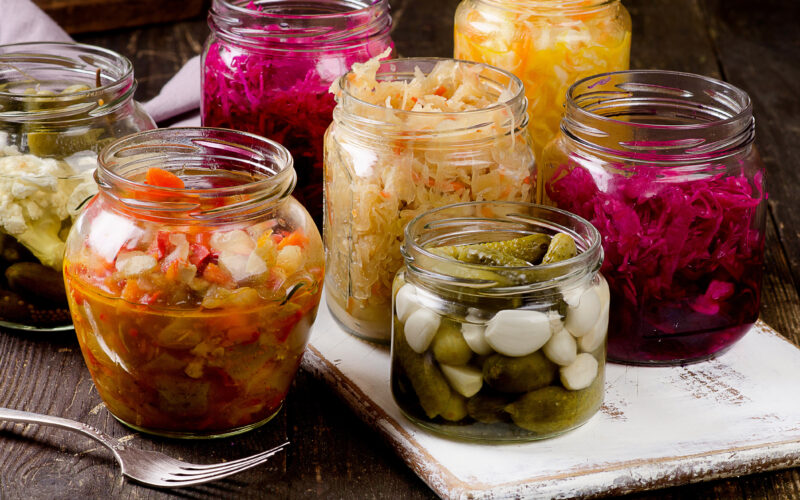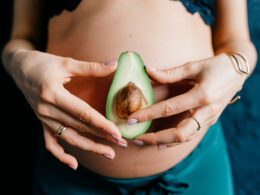Deep within your gut is a vibrant ecosystem of billions of microscopic organisms. We live in harmony with this tiny world. Without this microscopic biome, known as the gut microbiome, we wouldn’t be able to perform such essential life functions as digestion, maintaining balanced emotions, responding to unfriendly bacteria and viruses, and more [1]. Scientists have only recently come to appreciate the role the gut microbiome plays in our health and well-being, but despite still having many unanswered questions, they have affectionately nicknamed it our “second brain” [2].
At birth, a baby’s gut microbiome isn’t developed yet
But unlike our brains, we are not born with our gut microbiomes. This is because the womb is an almost-sterile environment. In fact, a baby’s first introduction to bacteria comes as he or she passes through the birth canal. As a mother nears labor, her vaginal microbiota decreases in diversity, and populates with the specific types of bacteria her baby will need [3].
As the baby grows outside the womb, the mother’s body continues to introduce new bacteria to her baby through breastfeeding [4]. The skin around the nipple becomes home to the bacteria that will be passed to the baby, and breast milk contains the essential nutrients the bacteria need to thrive in the baby’s gut.
When the baby begins to explore his or her environment and eat solid foods, even more species of bacteria are introduced. Babies explore objects with their mouths for many reasons, but one of the great benefits is the introduction of important natural bacteria. By the age of three, a child’s microbiome resembles an adult’s, and will be made up of a collection of microorganisms as unique to them as their fingerprint or DNA [5].
The gut microbiome matters throughout a woman’s entire lifespan
Our gut microbiome continues to change and adapt to our needs as we grow. Women especially depend on their gut to support their physical and mental health during their fertile years. One’s microbiome is involved in hormone regulation, and slight variants in bacteria makeup can be found with the fluctuations of estrogen and progesterone during each menstrual cycle phase [6].
Issues with hormone irregularity, such as with polycystic ovary syndrome (PCOS), are linked to a lack of microbiome diversity and absence of some specific bacteria known to be involved in hormone processing [6]. As fertility declines in menopause, a woman’s microbiome shifts to a makeup more similar to those found in men [6].
The relationship between gut health and fertility is still in the early phases of research, but scientists are hopeful that the microbiome could hold the key to natural interventions for anxiety and depression, cancer prevention and treatment, conditions related to infertility, and severe menopausal symptoms [6].
The gut microbiome changes during pregnancy…
One of the most dramatic changes in microbiome diversity occurs during pregnancy [7]. Usually, the gut microbiome rapidly breaks down sugars and plays a key role in maintaining a healthy weight. However, during pregnancy, the mother experiences slower metabolism in order to gain needed weight and store energy. Her gut microbiome actually responds to pregnancy hormones by adjusting its bacterial makeup to promote insulin resistance and fat storage [8].
Our guts also play a key role in our immune system response to potential harmful invaders. During pregnancy, in order to protect mom and baby, the gut becomes incredibly sensitive and responds to immune threats that would normally not cause alarm in the system [8].
….and this benefits a mother and her baby
A healthy gut microbiome during pregnancy and postpartum comes with numerous benefits for mom and baby. Women with healthy guts are at lower risk for gestational diabetes and preeclampsia, two serious conditions that can occur during pregnancy [9]. Babies with healthy guts have strong immune systems, develop allergies at lower rates, have a lower risk of type 1 diabetes, and have a lower lifetime risk of obesity [7].
How to grow a healthy gut microbiome
Maintaining a healthy gut can be achieved through some simple diet adjustments and lifestyle changes. You can introduce healthy bacteria, also known as probiotics, to your body through eating fermented foods and natural organic fruits and vegetables that have been cleaned, but not sterilized. Some examples of fermented foods are kombucha, Greek yogurt, kimchi, miso, sourdough bread, and sauerkraut. Make sure if you’re purchasing these foods from a store (as opposed to making them yourself) that the ingredients list does not contain preservatives, as these can kill the healthy bacteria you are trying to introduce into your gut. Also, know that pasteurization kills good bacteria as well.
After the probiotics have been introduced into your body, they need to be nourished with naturally fiber-rich foods, known as prebiotics. Some examples of prebiotics include mushrooms, apples, bananas, beans, artichokes, fennel, cabbage, kale, onions, garlic, and broccoli [10].
Ways to damage your gut microbiome
Unfortunately, gut health can be easily disrupted by engaging in poor health behaviors. The biggest risks to your gut health are consuming alcohol and excessive amounts of sugar, smoking, and taking antibiotics.
Alcohol and smoking
Alcohol and smoking are generally understood to negatively impact one’s health, and concern about one’s gut health is just another reason to exercise caution around these substances. Alcohol sugars are food for less desirable unhealthy bacteria, which can lead to gut irritation in the short-term, and more serious issues related to poor gut health such as anxiety, depression, insulin resistance, and more in the long-term [11]. Smoking changes the body’s composition of bacteria, increasing risk for oral diseases, and in the long-term, negatively impacts gut health in similar ways to alcohol [12].
Sugar
A diet heavy in refined sugar is also known to damage the gut microbiome. In fact, according to a 2021 article published in the official clinical practice journal of the American Gastroenterological Association, “excessive intake of free sugars can cause many of the same health problems as excessive alcohol consumption” [13]. Furthermore, “excessive sugar intake disrupt the intestinal barrier, thus increasing gut permeability and causing profound gut microbiota dysbiosis.” The negative impacts of sugar on the gut can even increase one’s risk for infection.
Antibiotics
Antibiotics are designed to destroy bacteria that is causing harm in one’s body. Unfortunately, antibiotics are unable to discriminate between good and bad bacteria, meaning they will kill the healthy bacteria in your gut just as they’re killing the bad bacteria currently making you sick [14]. The benefits of antibiotics can outweigh the costs, but intentionally replenishing your gut through probiotics and prebiotics after a round of antibiotics is essential. Make sure to discuss your concerns about your gut health with your doctor and ask for any advice they might have to help you get back on track.
What about C-sections, antibiotics during pregnancy, and your baby’s gut microbiome?
Remember that a baby’s first introduction to the bacteria that will populate their gut is in the birth canal. But many babies, for various reasons, are delivered through C-section. Mothers can opt to have vaginal fluids spread around the baby’s mouth and nose in order to promote microbiome development, a process known as vaginal seeding [15]. A small, observational 2016 study found that vaginal seeding partially restored gut microbiomes in infants up to one month old [16]. A larger 2021 study had similarly promising results [17]. A summary of research plus what still needs to be studied is here [18].
Sometimes antibiotics must be used during labor which can impact the makeup of a mother’s birth canal as well as prevent healthy bacteria from surviving in the baby’s gut [15]. In both this situation and in a C-section, breastfeeding your baby can help foster healthy microbiome development in the following weeks and months despite setbacks at birth [19].
Mothers should discuss infant probiotic options with their doctors if they are concerned about their child’s gut development. Infant probiotics may also be a good alternative for babies with mothers who are unable to breastfeed or who need to use antibiotics while breastfeeding. Finally, beginning to eat solid foods introduces a wide array of healthy bacteria into a young child. Combinations of fiber-rich prebiotics and bacteria-dense probiotics (as found in strawberries and Greek yogurt, or in lentil soup and sourdough bread, to name two such meals) are great first foods.
The bottom line
There are many important relationships in your life, but few are as important to your lifelong wellbeing as the one with those tiny invisible organisms who call your gut their home. Making small changes to your diet and increasing awareness of the potentially negative impact alcohol, excessive sugar, smoking, and antibiotics can have on your gut can lead to major improvements to your health. Don’t neglect your “second brain” and it wont neglect you!
This article was edited on November 29, 2024, to include additional resources on vaginal seeding.
Additional Reading:
How Dad’s gut microbiome affects baby
How to intentionally promote better gut health after getting off birth control
Vaginal seeding: The controversial postpartum trend for Cesarean moms











